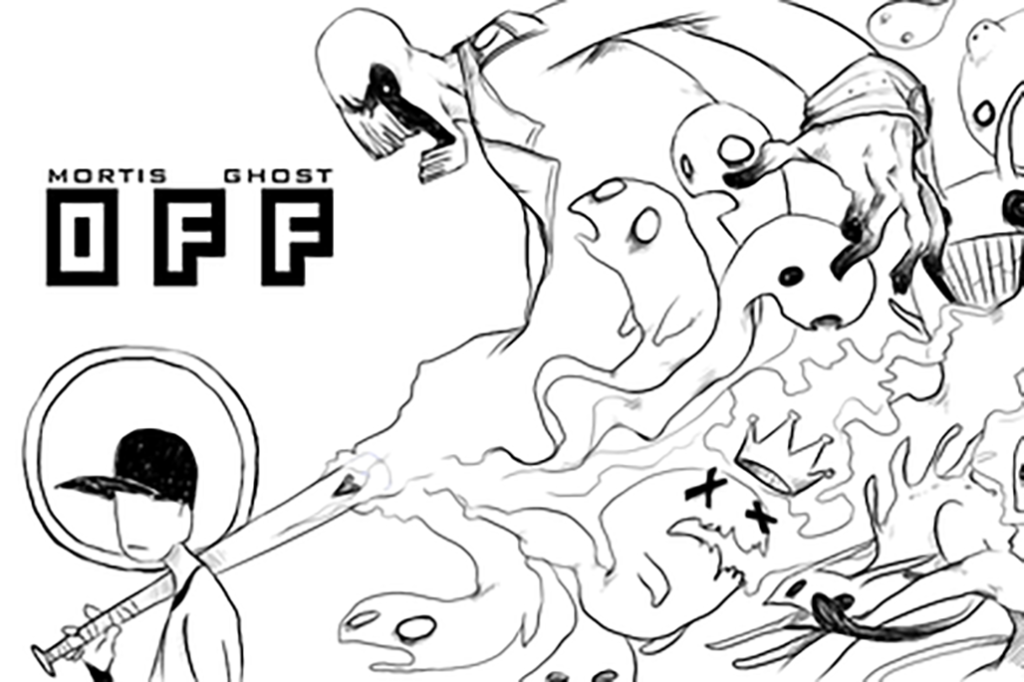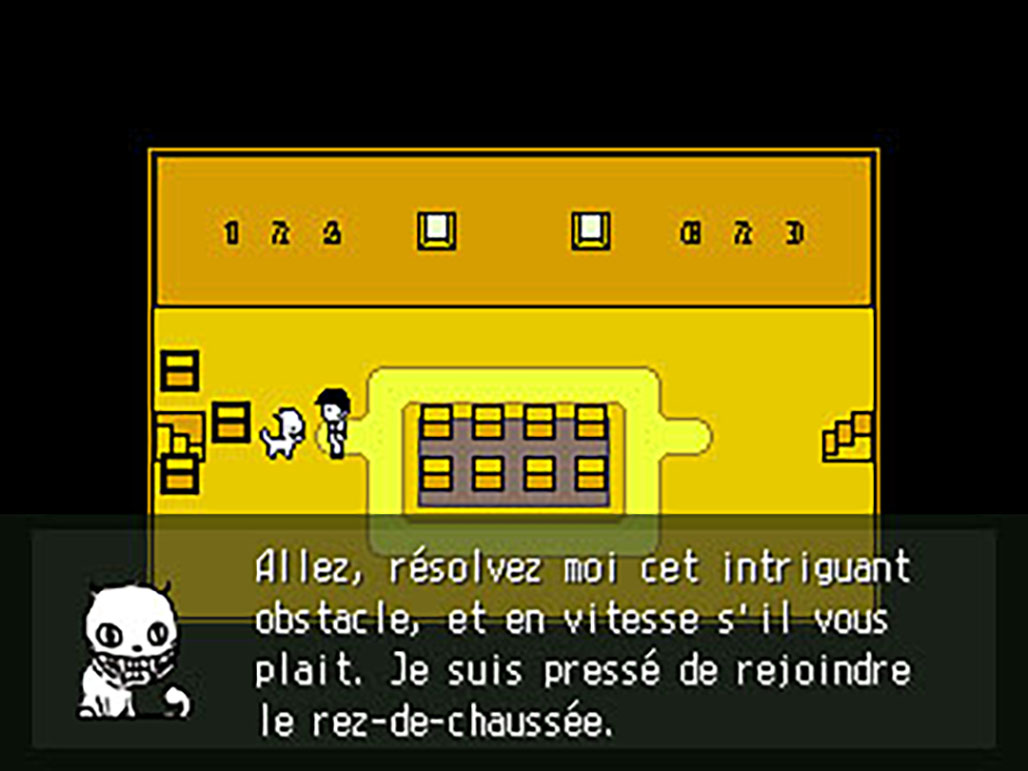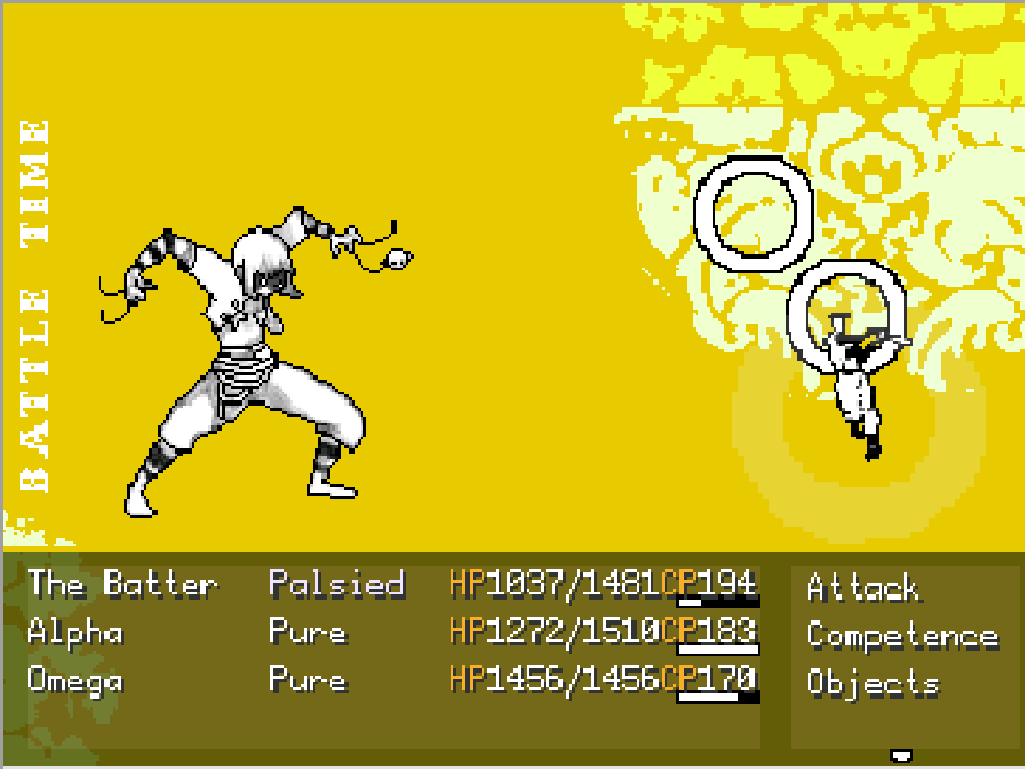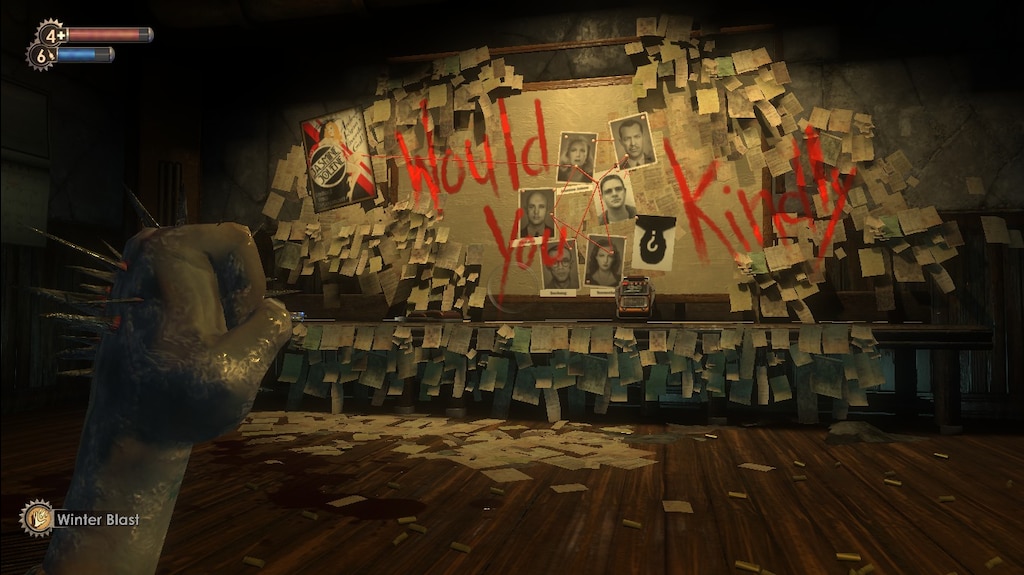
Provided by Mortis Ghost
Accepting the Mission in OFF
The role of the audience and their participation in a piece of art is something that has long been pondered over. Marina Abramovic’s 1974 performance art piece Rhythm 0 saw her standing in a room with 72 objects including things like a feather, honey, a whip, a gun, and a single bullet, for six hours. She allowed the audience to do whatever they liked to her; at one point a man actually took the pistol, loaded it with the bullet, and placed it against her head. The point of the piece was to see how far the audience would go in the six hours the performance would last for, and the results were that she was met with much actual violence. The piece asked ‘what would you do if you had the opportunity to hurt someone as much as you like?’ For Mortis Ghost’s cult classic OFF, the audience is questioned in a similar way: ‘what would you do if you learned you might be responsible for an enormous amount of violence?’
Originally released in 2008 for free only in French, OFF is an eclectic RPG inspired by the likes of Final Fantasy, Killer7, and Myst. While the creator Mortis Ghost says he never played any of the games before, OFF is also frequently likened to the Earthbound series, due to it’s off kilter dialogue and graphical style. OFF stars a character known only as The Batter, a pale white ‘being’ who is very literally dressed in a baseball uniform, with a bat as his weapon.

Before you are introduced to the protagonist, however, you’re asked to put in your own name, and whether you are a boy or a girl. You are then “assigned” to The Batter. You’re told they have an important mission, and to “be sure that it’s accomplished”, with no other context. Soon after, you meet a terrifying cat called ‘The Judge’, who talks to you, the player, directly, and you learn The Batter’s mission is to “purify the world.” In essence, the mission that you are taking part in is one which will see the death of all living things in this unfamiliar world. If this sounds familiar to you, then you’ve most likely completed the distastefully named ‘Genocide Route’ of UNDERTALE.
The two games differ in a couple of important ways, however. In UNDERTALE, the main gameplay is a bullet hell inspired, turn based combat system. OFF has a fairly standard turn based RPG system, most likely because it was made in RPG Maker. Except for the most part, you don’t really have to play the game. There’s an auto-combat function which runs through the battles for you, and honestly feels like the best way to play , as the mechanics really are your bog standard turn-based combat affair. The only time I found myself needing to be an active participant in the battles were during the boss fights – essentially, the only thing you have to do is move The Batter from place to place.

In contrast, UNDERTALE makes you fight, if you so choose, that being the other core difference; where OFF only offers you a single choice at the very end of the game, UNDERTALE requires you to make choices every step of the way. You have to engage in the mechanics, pacifist route or otherwise. OFF’s decision to make combat optional, for all intents and purposes, should really absolve you of any guilt. Except, according to the game, it doesn’t.
After you’ve helped The Batter reach the end of their mission to purify the world (i.e. killing everything you come across, including a woman who might be The Batter’s wife, and possibly their child), The Judge offers an ultimatum to you, the player. You can either stay with The Batter to complete one final task, or you can join The Judge in taking down The Batter. But in the moment leading up to that decision, The Judge takes on his namesake, asking you: “Is the obscuring mist of narrative really your excuse for killing wife and child?” When I was met with this line, I thought to myself “hang on a minute, I’ve not even done anything, I’ve had the auto-combat on as much as I could”. The dialogue and narrative thus far contradicted what the gameplay allowed me to do – I’m not the one who killed the wife and child, The Batter is. The question felt wholly unfair.
What’s all the more frustrating about The Judge, is the way he functions as a tutorial and guide character. He teaches you, the player, how to control The Batter in combat. He gives you hints along the way, on things you need to do or places you need to go. Why, if in the last moment of the game he tries to stop you, does he facilitate your ability to reach that point in the first place? It undermines the question he asks you, when he himself is somewhat responsible for these events.
OFF isn’t alone in judging the player for the actions they may or may not have taken. Only one year prior, we were introduced to the world of Bioshock. The most notable moment of this game, is of course the reveal of the meaning behind the words “would you kindly?” Throughout your journey through the city of Rapture, you’re guided by an Irish revolutionary who goes by the name Atlas. Whenever he asks you to do something, he rounds it off with a kindhearted, almost charming “would you kindly?” and of course, you oblige. Then comes the twist: you learn from the founder of Rapture, Andrew Ryan, that you’re hardwired to always obey when you hear those innocuous words.

It’s meant to be a bit of a ‘gotcha’ moment; when I first played the game, a few years after it’s release at the age of 17, it sure did get me. “Wow”, I thought, “I really did just do as I was told.” But it’s an incredibly unfair, obnoxious, and simply offensive moment in retrospect. Ryan literally says the words to you “A man chooses. A slave obeys.” The use of the word slave feels incredibly uncomfortable. I understand the game is set in an alternate reality 1960s, and Ryan isn’t meant to be perceived as a good person, but in this moment the game is saying to the player that carrying out what Atlas tells you to do, when you have literally no other choice in the matter, is comparable to being a slave.
The only decision you can make in the game is whether you save or harvest the little sisters, the results of which factor into one of three endings. And really, it’s two endings, with the supposed two bad endings only being different deliveries of the same dialogue. Bioshock essentially says to you “the only choice you can make barely matters”, and that feels wholly unfair to the player. In contrast, the small decision you do get to make in OFF at least feels like it has an impact.
If you, the player, decide to take the side of The Batter, and successfully kill The Judge, they will walk up to a switch and turn everything, whatever everything is, off, finally explaining the name of the game. Alternatively, if you take the side of The Judge, you’re able to kill The Batter, leaving you and the former as the sole beings to exist in this horrific world. This singular decision you get to make doesn’t change the world, but it at least gives The Judge some satisfaction in the mission of purification being incomplete.
His final words, and the final words of the game are “nothing remains except for our regrets.”
Yet I had no regrets – the game purposefully made the distinction between the player and The Batter. Even in that final moment the game made an assumption of me that it had no right to make. Much like in Bioshock, where I am not a slave for following a linear narrative, I am not responsible for the total eradication of the inhabitants of the world in OFF.
As mentioned earlier, I barely even played the game because of the auto-combat. It would be very fair to say that OFF is a sort of proto-UNDERTALE, the latter building off of the ideas of the former. Sans even acts as a literal judge of your actions in one of the final moments of the game, and it feels fairer because you can make a choice as to whether you’re merciful or murderous. Even still, I don’t think there will ever be a perfect answer in games, films, theatre, or performing arts when it comes to the role of the audience, but maybe the eternal questioning of it will be more interesting than any actual answer.





